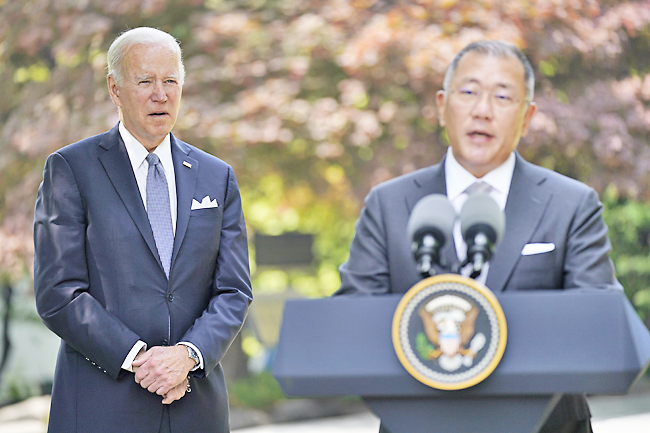SEOUL (AP) – United States (US) President Joe Biden tended to both business and security interests yesterday as he wrapped up a three-day visit to South Korea, showcasing Hyundai’s pledge to invest at least USD10 billion in electric vehicles and related technologies in the US.
Before visiting US and South Korean troops monitoring the rapidly evolving North Korean nuclear threat, Biden said the US was ready for any provocation that Kim Jong-un might deliver.
Hyundai’s investment includes USD5.5 billion for an electric vehicle and battery factory in Georgia.
Appearing with Biden, Hyundai CEO Chung Eui-sun said yesterday his company would spend another USD5 billion on artificial intelligence for autonomous vehicles and other technologies.
“Electric vehicles are good for our climate goals, but they’re also good for jobs,” Biden said.
“And they’re good for business.”

The major US investment by a South Korean company is a reflection of how the US and South Korea are leveraging their military ties into a broader economic partnership.
Biden said he was not concerned about any possible provocation by North Korea while he is touring the region.
“We are prepared for anything North Korea does,” Biden said in response to a reporter’s question.
“We’ve talked through how we’d respond to whatever they do so I am not concerned, if that’s what you’re suggesting.”
The US president has made greater economic cooperation with South Korea a priority, saying on Saturday that “it will bring our two countries even closer together, cooperating even more closely than we already do, and help strengthen our supply chains, secure them against shocks and give our economies a competitive edge”.
The pandemic and Russia’s invasion of Ukraine in February has forced a deeper rethinking of national security and economic alliances. Coronavirus outbreaks led to shortages of computer chips, autos and other goods that the Biden administration said can ultimately be fixed by having more manufacturing domestically and with trusted allies.
Biden’s meeting yesterday with Hyundai’s chief comes after the president made an earlier stop at a computer chip plant run by Samsung, the Korean electronics giant that plans to build a USD17 billion production facility in Texas.
Hyundai’s Georgia factory is expected to employ 8,100 workers and produce up to 300,000 vehicles annually, with plans for construction to begin early next year and production to start in 2025 near the unincorporated town of Ellabell. But the Hyundai plant shows that there are also trade-offs as Biden pursues his economic agenda.
The president earlier in his term tried to link the production of electric vehicles to automakers with unionised workers. As part of a USD1.85 trillion spending proposal last year that stalled in the Senate, Biden wanted extra tax credits to go to the buyers of EVs made by unionised factories.
That would have provided a boost to the unionised auto plant owned by General Motors Co, Ford Motor Co and Stellantis NV at a vital moment when union membership nationwide has been steadily decreasing.
During the Samsung visit, Biden called on Korean companies building plants in the US to hire union workers. In addition to its coming Texas plant, Samsung has a deal in place with Stellantis to build an electric vehicle battery manufacturing plant in the US.
“I urge Samsung and Stellantis and any company investing in the US to enter into partnerships with our most highly skilled and dedicated and engaged workers you can find anywhere in the world: American union members,” he said.






